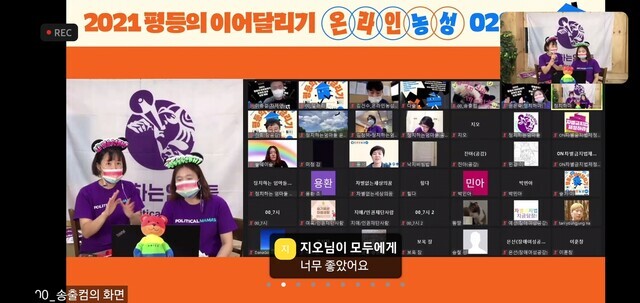hankyoreh
Links to other country sites 다른 나라 사이트 링크
Activists turn to online space for protests amid pandemic

Non-face-to-face protests, which began as an adaptation due to the prolongment of COVID-19, are evolving into a range of forms including online video call protests, simultaneous on and offline demonstrations, and protests using augmented reality.
The “2021 Online Relay Protest for Equality,” organized by the South Korean Coalition for Anti-discrimination Legislation, is one of those events being held virtually due to the pandemic as offline demonstrations are not possible except for one-person protests.
The protest, calling for the enactment of anti-discrimination laws, runs ten hours a day Monday to Friday from 11 am to 9 pm for a total of 17 days from Wednesday to Sept. 17.
A scene from the event on Thursday included Oh Eun-seon, a member of the civic group “Political Mamas,” sharing her experience facing discrimination as a woman.
“When I was working in an office in my 20s, making and serving tea for customers was a job for female staff. Even if I was in the middle of eating, my team leader would call me if there was tea to be made,” Oh said.
Her remarks were met with applause from each of the participants, who were each in their own space at home, the office or in a cafe.
After speaking time, which ran from 1 to 3pm in the Political Mamas meeting, came to an end, participants affiliated with the Justice Party and Catholic Rights continued to talk. They are making maximum use of Zoom to carry out a range of programs on par with offline demonstrations.
Online protests are even collaborating with offline “crawling” and one-person demonstrations.
Monks from the Jogye Order of Korean Buddhism’s Social and Labor Council including Jimong and Jongsu began a “30 kilometer crawl for the enactment of anti-discrimination legislation in a regular session of the National Assembly,” on Monday.
They plan to travel 3 kilometers each day and arrive at the National Assembly on Sept. 10.
Citizens who apply for a one-person demonstration time slot through the online protest website, will be given a designated time and place by the protest organizer where they can go and hold a one-person protest with a placard for 30 minutes to an hour.
There is also a growing number of demonstrations seeking out augmented reality worlds.
In July, Cultural Action held a “demonstration for the legalization of the tattoo industry” in the metaverse app “Hidden Order.” Placards with slogans such as “Are you saying my eyebrows are illegal?” were seen during this protest, and 200 or so avatars wearing red headbands and vests took part in the event.
By Chai, Yoon-tae, staff reporter
Please direct comments or questions to [english@hani.co.kr]

Editorial・opinion
![[Column] Season 2 of special prosecutor probe may be coming to Korea soon [Column] Season 2 of special prosecutor probe may be coming to Korea soon](https://flexible.img.hani.co.kr/flexible/normal/500/300/imgdb/original/2024/0426/3317141030699447.jpg) [Column] Season 2 of special prosecutor probe may be coming to Korea soon
[Column] Season 2 of special prosecutor probe may be coming to Korea soon![[Column] Park Geun-hye déjà vu in Yoon Suk-yeol [Column] Park Geun-hye déjà vu in Yoon Suk-yeol](https://flexible.img.hani.co.kr/flexible/normal/500/300/imgdb/original/2024/0424/651713945113788.jpg) [Column] Park Geun-hye déjà vu in Yoon Suk-yeol
[Column] Park Geun-hye déjà vu in Yoon Suk-yeol- [Editorial] New weight of N. Korea’s nuclear threats makes dialogue all the more urgent
- [Guest essay] The real reason Korea’s new right wants to dub Rhee a founding father
- [Column] ‘Choson’: Is it time we start referring to N. Korea in its own terms?
- [Editorial] Japan’s rewriting of history with Korea has gone too far
- [Column] The president’s questionable capacity for dialogue
- [Column] Are chaebol firms just pizza pies for families to divvy up as they please?
- [Column] Has Korea, too, crossed the Rubicon on China?
- [Correspondent’s column] In Japan’s alliance with US, echoes of its past alliances with UK
Most viewed articles
- 1AI is catching up with humans at a ‘shocking’ rate
- 2Korea’s 1.3% growth in Q1 signals ‘textbook’ return to growth, says government
- 3Is Japan about to snatch control of Line messenger from Korea’s Naver?
- 4After election rout, Yoon’s left with 3 choices for dealing with the opposition
- 5No good, very bad game for Korea puts it out of Olympics for first time since 1988
- 6Will NewJeans end up collateral damage in internal feud at K-pop juggernaut Hybe?
- 7[Column] Season 2 of special prosecutor probe may be coming to Korea soon
- 81 in 5 unwed Korean women want child-free life, study shows
- 9[Column] Park Geun-hye déjà vu in Yoon Suk-yeol
- 10‘We must say no’: Seoul defense chief on Korean, USFK involvement in hypothetical Taiwan crisis